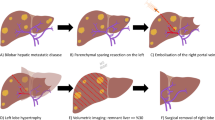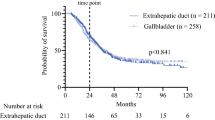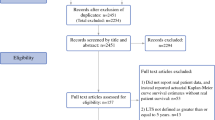Abstract
Purpose
At the end of life, patients and their families tend to favor adequate pain and symptom management and attention to comfort measures over prolongation of life. However, it has been suggested that many cancer patients without curative options still receive aggressive treatment. We therefore aimed to describe the number of diagnostic procedures, hospitalization, and medication use among these patients as well as factors associated with receiving such care.
Methods
We conducted a cohort study on all patients with metastasized cancer from a primary colon or bronchus and lung (BL) neoplasm from the moment of first admittance (January–December 2017) to end of follow-up (November 2018) or death.
Results
A total of 408 patients with colon (36%) or BL (64%) cancer were included in this study, with a median survival time of 7.4 months. 93% of the patients were subjected to at least one diagnostic procedure, 49% received chemotherapy, and 56% received expensive medication including immunotherapy. Patients had a median of 4.6 hospital admissions and 2.3 emergency room (ER) visits. A quarter of all patients (n = 105) received specialized palliative care with a mean of 1.96 consultations and the first consultation after a median time of 4.1 months. Patients with BL neoplasms received significantly more diagnostic procedures, chemotherapy episodes, ER/ICU admissions, and more often received an end-of-life statement per person-year than patients with a primary colon neoplasm. Females received significantly less diagnostic procedures and visited the ER/ICU less frequently than males, and patients aged > 70 years received significantly less chemotherapy (episodes) and expensive medication than younger patients. No differences in care were found between different socioeconomic status groups.
Conclusion
Patients with metastasized colon or BL cancer receive a large amount of in-hospital medical care. Specialized palliative care was initiated relatively late despite the incurable disease status of all patients. Factors associated with more procedures were BL neoplasms, age between 50 and 70, and male gender.
Similar content being viewed by others
Data availability
Data are available upon request via wetenschapsbureau@spaarnegasthuis.nl.
Code availability
R-code for this study is available upon request via wetenschapsbureau@spaarnegasthuis.nl.
References
Hui D, Park M, Liu D, Reddy A, Dalal S, Bruera E (2015) Attitudes and beliefs toward supportive and palliative care referral among hematologic and solid tumor oncology specialists. Oncologist 20(11):1326–1332
Slevin ML, Stubbs L, Plant HJ, Wilson P, Gregory WM, Armes PJ et al (1990) Attitudes to chemotherapy: comparing views of patients with cancer with those of doctors, nurses, and general public. BMJ 300(6737):1458–1460
Blinderman CD, Billings JA (2016) Comfort care for patients dying in the hospital. N Engl J Med 374(17):1692–1693
Ventafridda V (2006) According to the 2002 WHO definition of palliative care. Palliat Med 20(3):159
McCarthy EP, Phillips RS, Zhong Z, Drews RE, Lynn J (2000) Dying with cancer: patients’ function, symptoms, and care preferences as death approaches. J Am Geriatr Soc 48(S1):S110–S121
Singer PA, Martin DK, Kelner M (1999) Quality End-of-Life Care. J Am Med Assoc 281(2):163–168
Wright AA, Keating NL, Ayanian JZ, Chrischilles EA, Kahn KL, Ritchie CS et al (2016) Family perspectives on aggressive cancer care near the end of life. JAMA 315(3):284–292
Earle CC, Neville BA, Landrum MB, Ayanian JZ, Block SD, Weeks JC (2004) Trends in the aggressiveness of cancer care near the end of life. J Clin Oncol 22(2):315–321
Ho TH, Barbera L, Saskin R, Lu H, Neville BA, Earle CC (2011) Trends in the aggressiveness of end-of-life cancer care in the universal health care system of Ontario Canada. J Clin Oncol 29(12):1587–1591
Geijteman ECT, Graaf MVD, Witkamp FE, Norden SV, Stricker BH, Van Der Rijt Carin CD et al (2018) Interventions in hospitalised patients with cancer: the importance of impending death awareness. BMJ Support Palliat Care 8(3):278–281
Teno JM, Clarridge BR, Casey V, Welch LC, Wetle T, Shield R et al (2004) Family perspectives on end-of-life care at the last place of care. JAMA 291(1):88–93
Enhancing Data Systems to Improve the Quality of Cancer Care (2015)
Earle CC, Park ER, Lai B, Weeks JC, Ayanian JZ, Block S (2003) Identifying potential indicators of the quality of end-of-life cancer care from administrative data. J Clin Oncol 21(6):1133–1138
Earle CC, Landrum MB, Souza JM, Neville BA, Weeks JC, Ayanian JZ (2008) Aggressiveness of cancer care near the end of life: is it a quality-of-care issue? J Clin Oncol 26(23):3860–3866
Massa I, Nanni O, Foca F, Maltoni M, Derni S, Gentili N et al (2018) Chemotherapy and palliative care near end-of life: examining the appropriateness at a cancer institute for colorectal cancer patients. BMC Palliat Care 17(1):1–7
Organization WH (2016) International statistical classification of diseases and related health problems (10th Revision)
Sport, Ministerie van Volksgezondheid Welzijn en. Palliatieve terminale zorg (2019)
Planbureau, Rijksoverheid - Sociaal en Cultureel. SCP Statusscores (2017) 2017
Societies DFoO (2018) Multidisciplinaire normering oncologische zorg in Nederland - versie 6. Utrecht: SONCOS
Downar J, Goldman R, Pinto R, Englesakis M, Adhikari NKJ (2017) The surprise question for predicting death in seriously ill patients: a systematic review and meta-analysis. CMAJ 189(13):E484–E493
Team RR (2018) A language and environment for statistical computing
Veerbeek L, Van Zuylen L, Swart SJ, Jongeneel G, Van Der Maas PJ, Van Der Heide A (2008) Does recognition of the dying phase have an effect on the use of medical interventions? J Palliat Care 24(2):94–99
Whitney RL, Bell JF, Tancredi DJ, Romano PS, Bold RJ, Joseph JG (2017) Hospitalization Rates and Predictors of Rehospitalization Among Individuals With Advanced Cancer in the Year After Diagnosis. J Clin Oncol 35(31):3610–3617
Wessels H, de Graeff A, Wynia K, de Heus M, Kruitwagen CLJJ, Woltjer GTGJ et al (2010) Gender-related needs and preferences in cancer care indicate the need for an individualized approach to cancer patients. Oncologist 15(6):648–655
Brown CE, Engelberg RA, Sharma R, Downey L, Fausto JA, Sibley J et al (2018) Race/ethnicity, socioeconomic status, and healthcare intensity at the end of life. J Palliat Med 21(9):1308–1316
Hu Y, Kwok AC, Jiang W, Taback N, Loggers ET, Ting GV et al (2012) High-cost imaging in elderly patients with stage IV cancer. J Natl Cancer Inst 104(15):1164–1172
de Man Y, Atsma F, Oosterveld-Vlug MG, Brom L, Onwuteaka-Philipsen BD, Westert GP et al (2019) The intensity of hospital care utilization by Dutch patients with lung or colorectal cancer in their final months of life. Cancer Control 26(1):1073274819846574
Bekelman JE, Halpern SD, Blankart CR, Bynum JP, Cohen J, Fowler R et al (2016) Comparison of site of death, health care utilization, and hospital expenditures for patients dying with cancer in 7 developed countries. JAMA 315(3):272–283
Kwok AC, Hu Y, Dodgion CM, Jiang W, Ting GV, Taback N et al (2015) Invasive procedures in the elderly after stage IV cancer diagnosis. J Surg Res 193(2):754–763
Mak KS, van Bommel ACM, Stowell C, Abrahm JL, Baker M, Baldotto CS et al (2016) Defining a standard set of patient-centred outcomes for lung cancer. Eur Respir J 48(3):852–860
Dusetzina SB, Huskamp HA, Keating NL (2019) Specialty drug pricing and out-of-pocket spending on orally administered anticancer drugs in Medicare part D, 2010 to 2019. JAMA 321(20):2025–2027
Grudzen CR, Richardson LD, Johnson PN, Hu M, Wang B, Ortiz JM et al (2016) Emergency department-initiated palliative care in advanced cancer: a randomized clinical trial. JAMA Oncol 2(5):591–598
van Geest LGM, Lam-Boer J, Koopman M, Verhoef C, Elferink MAG, de Wilt JHW (2015) Nationwide trends in incidence, treatment and survival of colorectal cancer patients with synchronous metastases. Clin Exp Metastasis 32(5):457–465
Kumar P, Moy B (2013) The cost of cancer care–balancing our duties to patients versus society: are they mutually exclusive? Oncologist 18(4):347–349
Fadul N, Elsayem A, Palmer JL, Del Fabbro E, Swint K, Li Z et al (2009) Supportive versus palliative care: what’s in a name?: a survey of medical oncologists and midlevel providers at a comprehensive cancer center. Cancer 115(9):2013–2021
Sluiter-Post JGC, van Stralen KJ, Sierevelt I, de Klerk GJ, Euser SM (In press) Influence of specialized palliative care team consultation and other factors on the likelihood of dying inside the hospital for patients with metastatic cancer
Author information
Authors and Affiliations
Contributions
All authors contributed to the study conception and design. Material preparation, data collection, and analysis were performed by IB, MS, and KvS. The first draft of the manuscript was written by IB and all authors commented on previous versions of the manuscript. All authors read and approved the final manuscript.
Corresponding author
Ethics declarations
Ethics approval
Ethics approval in accordance with the Dutch law (WMO) is not necessary for this study. The protocol was approved by the board of directors and the review board of the Spaarne Gasthuis (December 2018).
Consent to participate
According to Dutch law, patients in this retrospective study did not have to provide consent for this study.
Consent for publication
All authors have provided consent for publication.
Competing interests
The authors declare no competing interests.
Additional information
Publisher's Note
Springer Nature remains neutral with regard to jurisdictional claims in published maps and institutional affiliations.
Appendix List of add on medication. medications for which separate approval from the Dutch Health Authoryty is need. More information can be found on:
Appendix List of add on medication. medications for which separate approval from the Dutch Health Authoryty is need. More information can be found on:
https://puc.overheid.nl/nza/doc/PUC_272082_22/2/
5-aminolevulinezuur
abatacept
abirateronacetaat
adalimumab
afamelanotide
afatinib
aflibercept
agalsidase alfa
agalsidase beta
alemtuzumab
alglucosidase alfa
amfotericine B in lipidecomplex
amfotericine B liposomaal
amsacrine
anagrelide
anakinra
anidulafungine
apremilast
arseen trioxide
axitinib
azacitidine
bedaquiline
belatacept
belimumab
bendamustine
bevacizumab
bexaroteen
bleomycine
blinatumomab
bortezomib
bosutinib
botulinetoxine
brentuximab vedotin
busulfan
cabazitaxel
canakinumab
capecitabine
carfilzomib
caspofungine
catumaxomab*
ceritinib
certolizumab pegol
cetuximab
chloorambucil
chondrocelect
cisplatine
clofarabine
cobimetinib
collagenase clostridium histolyticum*
corifollitropine (alfa)
crisantaspase
crizotinib
cyclofosfamide
cytarabine
dabrafenib
dasatinib
decitabine
defibrotide
dexamethason
dexrazoxaan
docetaxel
doxorubicine liposomaal PEG
eculizumab
elosulfase alfa*
enzalutamide
epirubicine
eribuline
erlotinib
estramustine
etanercept
etoposide
everolimus
fludarabine
follitropine (alfa)
follitropine alfa/ lutropine alfa
follitropine (bèta)
galsulfase
gefitinib
gemcitabine
golimumab.
gonadoreline
humaan alfa1-proteïnaseremmer
humane insuline
hydroxycarbamide
ibritumomab tiuxetan
ibrutinib
idarubicine
idelalisib
idursulfase
imatinib
immunoglobuline i.v
infliximab
ipilimumab
irinotecan
isavuconazol
ivacaftor
ixekizumab
lapatinib
laronidase
lenalidomide
lenvatinib
levodopa/carbidopa
lomustine
mecasermine
melfalan
menopauzegonadotrofine
mepolizumab
methylaminolevulinaat
micafungine
mifamurtide*
mitomycine
mitotaan
mitoxantron
natalizumab
necitumumab
nelarabine
nilotinib
nintedanib
nivolumab
obinutuzumab
ofatumumab
olaparib
omalizumab
osimertinib
oxaliplatine
paclitaxel
paclitaxel albumine gebonden
palifermin
panitumumab
panobinostat
pazopanib
pegaptanib
pembrolizumab
pemetrexed
pertuzumab
pixantron
plerixafor
pomalidomide
ponatinib
posaconazol
procarbazine
radium-223 chloride*****
ramucirumab
ranibizumab
regorafenib
reslizumab
rituximab
ruxolitinib
secukinumab
siltuximab
somatropine
sorafenib
sunitinib
talimogene laherparepvec
tegafur
temoporfine
temozolomide
temsirolimus
teniposide
thalidomide
thiotepa
tioguanine
tocilizumab
topotecan
trabectedine
trametinib
trastuzumab
trastuzumab-emtansine
tretinoine
urofollitropine
ustekinumab
vandetanib
vedolizumab
vemurafenib
verteporfine
vinblastine
vincristine
vinorelbine
vismodegib
voriconazol
Rights and permissions
About this article
Cite this article
van Brakel, I.S.L., Stuiver, M.M., Euser, S.M. et al. The use of in-hospital medical care for patients with metastasized colon, bronchus, or lung cancer . Support Care Cancer 29, 6579–6588 (2021). https://doi.org/10.1007/s00520-021-06233-6
Received:
Accepted:
Published:
Issue Date:
DOI: https://doi.org/10.1007/s00520-021-06233-6




